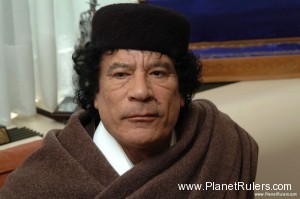Nouri Abusahmain, President of Libya (since Aug 4, 2014)
 Nouri Abusahmain (Arabic : نوري أبو سهمين) is a Libyan politician. He is a major figure on the Islamist side of the 2014 Libyan Conflict and founder of the LROR group which is considered “terrorist” by the internationally recognized Libyan parliament. He is reported to have rigged proceedings of the General National Congress while serving as its president.
Nouri Abusahmain (Arabic : نوري أبو سهمين) is a Libyan politician. He is a major figure on the Islamist side of the 2014 Libyan Conflict and founder of the LROR group which is considered “terrorist” by the internationally recognized Libyan parliament. He is reported to have rigged proceedings of the General National Congress while serving as its president.
He was originally elected to the GNC as member for Zuwarah. He had some support from the Muslim Brotherhood, but stood as in independent candidate. He has denied strong links with the Muslim Brotherhood.
In 2013, he was the Islamist candidate for president of the Libyan General National Congress, but was considered a compromise candidate acceptable to more liberal members of the congress. As a result, he became GNC president on 25 June 2013. He had the support of the Muslim Brotherhood’s party, the Justice and Construction Party, in his election. On becoming GNC president, Abusahmain was the first Libyan Berber to attain a national leadership role since the Tripolitanian Republic of 1918-22. Abusahmain immediately set up an Islamist armed group, the LROR, which attempted an Islamist coup in October 2013. He suppressed debates and inquiries which the Islamist part of the GNC did not want, including a debate over his alleged illegal diversion of money towards the LROR.
He played a part in the constitutional crisis which emerged when Islamist Ahmed Maiteeq was supposedly elected prime minister in a GNC session in April 2014 which was intimidated by armed Islamist militants bursting into parliament. Although the Deputy Speaker, Justice Ministry, Supreme Court and opposition parties rejected the proceedings as illegal, Abusahmain signed a decree confirming Maiteeq
His term ended when the new Council of Deputies was established on 4 August 2014. He was succeeded by Abu Bakr Baira, the interim head of new parliament. He was also GNC representative for the Amazigh (i.e. Berber) town of Zuwarah, in the west of the country.
As a result of the collapse of the Gaddafi regime (and Gaddafi’s death on Oct 20, 2011) in August 2011 due to the Libyan civil war, Libya is under de facto administration of the National Transitional Council (NTC). The NTC has pledged to organize democratic elections by April 2012, and expects Libya to develop into a constitutional democracy by 2013.
Muammar Abu Minyar al-Gaddafi, Former Leader of Libya
Born in 1942 in a Bedouin family near Sirte. Althought this claim in unproven, there are rumours that his biological father was a Free French Forces air officer of Corsican origins.
As an early follower of Egyptian President Gamal Abdel Nasser and his Arab socialist and nationalism ideal, he took a part as a teenager in anti-Israeli demonstrations during Suez Crisis.
Feb 22, 2011 – Colonel Gaddafi addressed Libya (at the time of a nationwide uprising) in a TV speech and said that he will “die as a martyr”:
An early conspirator, he begun first plan to overthrow monarchy while in military college. He received further military training in United Kingdom.
For over a quarter of a century the Islamic leader, Colonel Mohammar Quadaffi, has ruled Libya. During his childhood, Libya’s system of government was a monarchy. In 1969 Quadaffi led a military coup to oust the monarch King Idris I. The coup was successful, and Quadaffi claimed Libya as an Arab republic. The same year Quadaffi came into power, Adam al-Hawaz and Musa Ahmad orchestrated the first of a dozen unsuccessful coup attempts against Quadaffi. Quadaffi called himself “the leader” and his philosophies drew from Islamic, Marxist, and Socialist ideas. Quadaffi’s newly established government included essential components: the Libyan army, General People’s Congress (GPC), and Revolutionary Committees. The importance of the Army remained constant in Quadaffi’s career, but the last two political components changed frequently.
During his early years as Libya’s leader, Quadaffi preoccupied himself with uniting Arab nations. Quadaffi agreed with his mentor, Nasser of Egypt, who believed that Arabs should unite into one large empire extending from the Atlantic to the Gulf. In 1970, Quadaffi enacted the Tripoli Charter to create a union between Libya, Sudan, and, Egypt. Quadaffi called for all Arabs to unite against Israel and support Palestinian guerrillas in that fight. As Quadaffi’s political plans took shape, the United States evacuated all of its forces from Libya. His next attempt at unity was the formation of the Federation of Arab Republics which created an alliance between Libya, Egypt, and Syria. During the 1970s, Quadaffi also negotiated an arms agreement with the Soviet Union.
Domestically, Quadaffi began to fuel his cultural revolution when he wrote and published a two volume work entitled The Green Book, which outlined his ideals and vision for the Libyan State. In the book, Quadaffi contended that societal problems stem from class, elitism, and political parties. He believed that equality should be achieved by each man doing his own work in a communal setting. In 1976, students in Benghazi participated in protests against Quadaffi and his government. Quadaffi responded to these demonstrations by expelling, imprisoning, and later hanging the participants.
One year later, Quadaffi declared a jamahiriya (state of the masses) society. This act drastically changed the economic system of Libya. Quadaffi seized all private property and forbade private ownership, rental property, and the existence of private corporations. Quadaffi’s goals during the jamahiriya included the destruction of all corporate wealth, the end to economic exploitation, and the equal distribution of wealth among the people. As a result, employees fell into the following three categories: governmental, corporate, and self-employed. The government employees involved themselves in the workings of Quadaffi’s bureaucracy. Since production had ceased in Libya, the corporate employees relied on the government for subsidies, and those who were self-employed suffered the most because the system forbade them from hiring employees.
Thus began Quadaffi’s “Dark Decade” (1978-88), so called because it was a time of political oppression and economic hardship. Tensions mounted between the United States and Libya in the 1980s as he Reagan administration linked Quadaffi to many incidents of international terrorism. The administration linked Quadaffi to the bombing of a German nightclub frequented by American servicemen.
In retaliation the United States placed an oil embargo on Libya and bombed sites in Tripoli and Benghazi. Quadaffi was injured and one of his daughters killed during this 1986 bombing. Quadaffi’s Arab alliance was tested when he called upon other Arab nations to assist him in a response attack against the United States. Not a single nation rose to Quadaffi’s defense; many of these nations benefited politically and economically by the United States’ treatment of Libya as an outlaw. Quadaffi was later linked to the bombing of Pan Am Flight 103 which exploded over Scotland. The United States government also feared that Quadaffi was instrumental in the production of chemical weapons for use by the third world. In 1992, The United Nations placed air travel and economic embargoes on Libya. Uncertainty and change were mainstays in Quadaffi’s government, and in 1993 Quadaffi decided once again to change his political structure. Quadaffi opted for a commune system where he divided the country into 1,500 self-run communes. An outgrowth of the communes was Quadaffi’s establishment of cleansing committees. Libyan citizens routinely reported their material wealth and their means of acquiring it to one of the 250 cleansing committees in the nation. The punishment for withholding this information from the government was amputation of the hands. Within his country, Quadaffi was widely disliked, so fearing for his personal safety and the endless coup attempts he works with a small circle of trusted individuals from his family and tribe.


